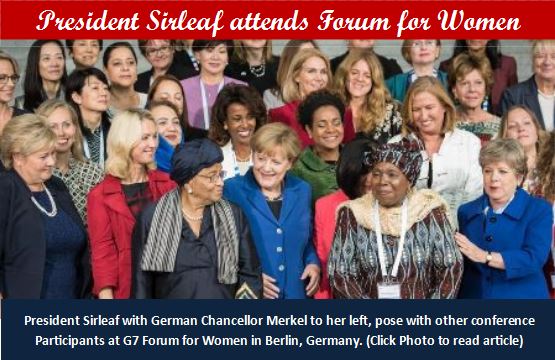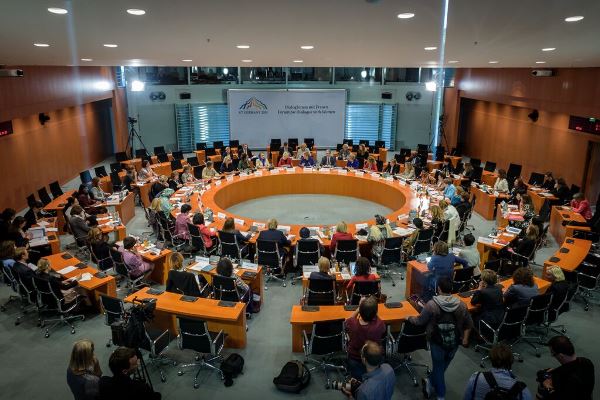
BERLIN, GERMANY – Thursday, September 17, 2015) President Ellen Johnson Sirleaf has told a forum for women empowerment that their role in global leadership has been remarkable and emulative; noting that women have been at the top of very sustainable leadership across all spheres of society and in all dimensions.
She said moving forward, women across the world need to join forces and place more emphasis on areas of women’s political participation, women in economic empowerment, in the digital world, health, and thematic areas which are not only critical but hold the keys to moving women forward and achieving success.
According to a dispatch, the Liberian leader made the assertion when she addressed the G7 Forum for Dialogue with Women in Berlin, Germany on Wednesday, September 16, 2015, bringing together hundreds of women political, academic, managerial, social and economic leaders from across the globe.
President Sirleaf said the Sustainable Development Goals (SDG) which shortly replaces the Millennium Development Goals (MDGs) provides a solid basis for women empowerment and development as the document was very consultative and captures, in a more active way, how the enhancement of women can be promoted globally.
Sharing her experience on how her country overcame the Ebola virus disease, the Liberian leader indicated that three key issues were critical in addressing and achieving an Ebola free Liberia. She named community engagement, mobilization and participation; sustained partnership and leadership.
Moving forward, she said to avoid such an outbreak in the future, community empowerment, development of health systems and institutions, a well-developed and functional health communication system and infrastructural development are not just cardinal but critical.
President Sirleaf thanked the women for the forum and said it provides the best opportunity on how women will address future leadership and sustainability issues, as they gather to discuss and share common goals and vision on how the world looks at and treat women issues globally.
Opening the forum, German Chancellor Angela Merkel welcomed the participants and praised the women for gathering to discuss their future especially after the G7 Summit in Munich, Germany in June which laid out a lot of ambitious plans and programs to support women globally.
Chancellor Merkel said the role of women need to be on the top agenda of all global discussions and conferences, adding that women's sustainable development as captured in the SGDs 2030 document is critical and viable.
The Germany Chancellor said the diversity of women is a critical weapon through which a lot can be achieved in making sure that women take their destiny into their own hands and engage all and every possible program that will change their lives and make them better people.
In the overall context of women political leadership, the forum participants agreed to remove barriers which prevent women from participating in political life which include discretionary laws, restrictive attitudes and gender stereotyping, low levels of education, lack of access to healthcare and disproportionate effects of poverty on women globally.
Participants indicated that women's empowerment is lacking due to technical and vocational education and training and that women needed to be assisted in order to improve their employability; provide more access to financial resources and funding to create the environment for more women entrepreneurs, especially in developing countries where most women operate smaller firms and work in less profitable sectors.
In the fast growing world of global digital technology, they agreed that for women to make progress, they need to be empowered to make use of the opportunities of modern digitization and that more women need to be encouraged to choose professional pathways that lead to the acquisition of skills in science, technology, engineering and mathematics.
On access to basic health, the participants argued that the health challenges faced by women are complex and that women contribute as caregivers and at times as members of the health workforce, yet the social determinants have a great impact on their wellbeing, especially those in low and middle income countries.
They said increasing education and training of female healthcare workers would have a two-fold effect: economic empowerment of the caregiving women as well as better provision for caretaking women.
The forum organized by the German Chancellor brought together over 100 women leaders including the Executive Director of the World Health Organization, (WHO), Margaret Chan; Director-General of the United Nations Development Programme (UNDP), Helen Clarke; CNN Chief International Correspondent, Christine Amanpour; and the United Nations Special Representative on Sexual Violence in Conflict, Zainab Bangura.
Others are the Chairperson of the African Union (AU), Nkosazana Dlamini-Zuma; Co-Chairperson of the Gates Foundation, Melinda Gates; Executive Director of the UN Women, Phumzile Mlambo-Ngcuka; Norwegian Prime Minister, Erna Solberg; and South African politician, Helen Zile, among others. Photos Below


